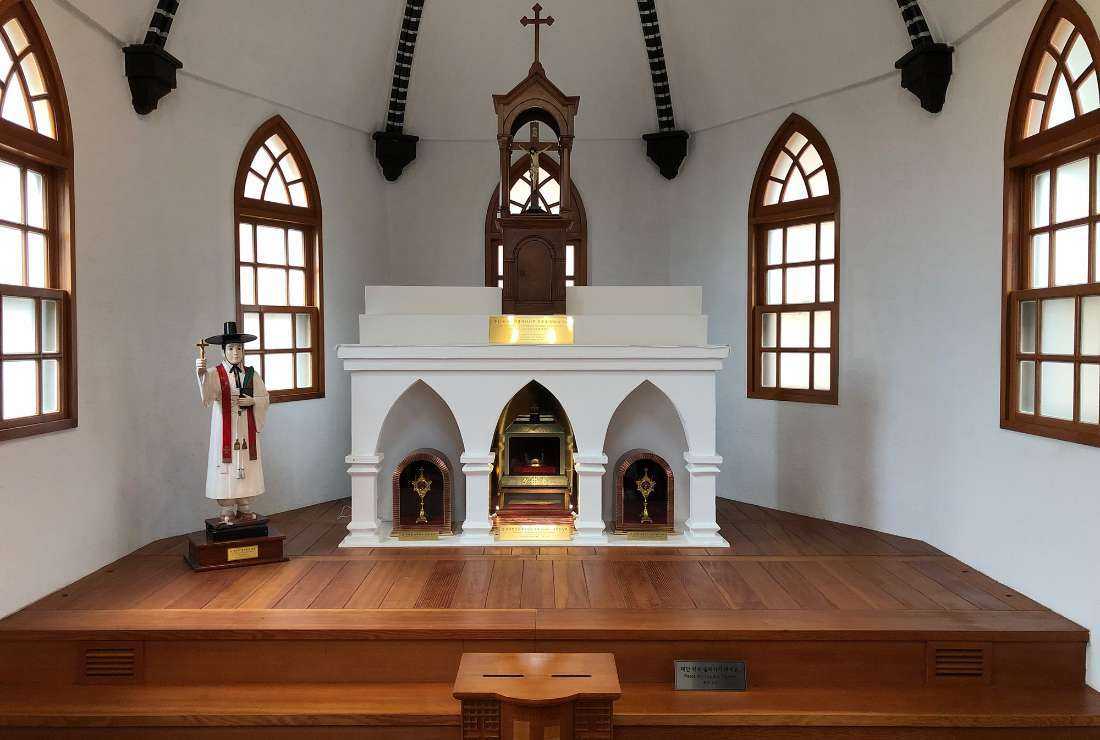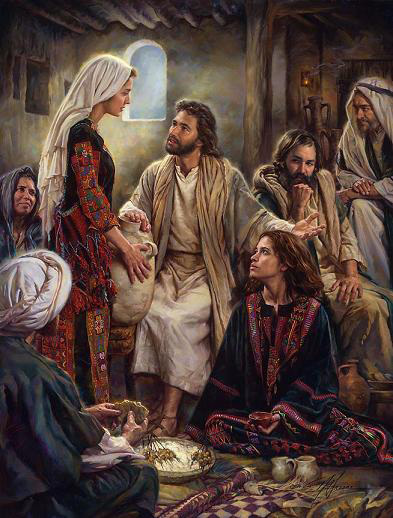Luke CHAP. 9
9:23–27
23. And he said to them all, If any man will come after me, let him deny himself, and take up his cross daily, and follow me.
24. For whosoever will save his life shall lose it: but whosoever will lose his life for my sake, the same shall save it.
25. For what is a man advantaged, if he gain the whole world, and lose himself, or be cast away?
26. For whosoever shall be ashamed of me and of my words, of him shall the Son of man be ashamed, when he shall come in his own glory, and in his Father’s, and of the holy angels.
27. But I tell you of a truth, there be some standing here, which shall not taste of death, till they see the kingdom of God.
CYRIL OF ALEXANDRIA. (non occ.) Great and noble leaders provoke the mighty in arms to deeds of valour, not only by promising them the honours of victory, but by declaring that suffering is in itself glorious. Such we see is the teaching of the Lord Jesus Christ. For He had foretold to His disciples, that He must needs suffer the accusations of the Jews, be slain, and rise again on the third day. Lest then they should think that Christ indeed was to suffer persecution for the life of the world, but that they might lead a soft life, He shews them that they must needs pass through similar struggles, if they desired to obtain His glory. Hence it is said, And he said unto all.
BEDE. He rightly addressed Himself to all, since He treats of the higher things (which relate to the belief in His birth and passion) apart with His disciples.
CHRYSOSTOM. (Hom. 55. in Matt.) Now the Saviour of His great mercy and lovingkindness will have no one serve Him unwillingly and from constraint, but those only who come of their own accord, and are grateful for being allowed to serve Him. And so not by compelling men and putting a yoke upon them, but by persuasion and kindness, He draws unto Him every where those who are willing, saying, If any man will, &c.
BASIL. (in Cons. Mon. cap. 4.) But He has left His own life for an example of blameless conversation to those who are willing to obey Him; as He says, Come after me, meaning thereby not a following of His body, for that would be impossible to all, since our Lord is in heaven, but a due imitation of His life according to their capacities.
BEDE. Now unless a man renounces himself, he comes not near to Him, who is above him; it is said therefore, Let him deny himself.
BASIL. (in reg. fus. int. 6.) A denial of one’s self is indeed a total forgetfulness of things past, and a forsaking of his own will and affection.
ORIGEN. (in Matt. tom. 12.) A man also denies himself when by a sufficient alteration of manners or a good conversation he changes a life of habitual wickedness. He who has long lived in lasciviousness, abandons his lustful self when he becomes chaste, and in like manner a forsaking of any crimes is a denial of one’s self.
BASIL. (ubi sup.) Now a desire of suffering death for Christ and a mortification of one’s members which are upon the earth, and a manful resolution to undergo any danger for Christ, and an indifference towards the present life, this it is to take up one’s cross. Hence it is added, And let him take up his cross daily.
THEOPHYLACT. By the cross, He speaks of an ignominious death, meaning, that if any one will follow Christ, he must not for his own sake flee from even an ignominious death.
GREGORY. (Hom. 32. in Ev) In two ways also is the cross taken up, either when the body is afflicted through abstinence, or the mind; touched by sympathy.
GREEK EXPOSITOR. (Isaac. Monac.) He rightly joins these two, Let him deny himself, and let him take up his cross, for as he who is prepared to ascend the cross conceives in his mind the intention of death, and so goes on thinking to have no more part in this life, so he who is willing to follow our Lord, ought first to deny himself, and so take up his cross, that his will may be ready to endure every calamity.
BASIL. (ubi sup. lnt. 8.) Herein then stands a man’s perfection, that he should have his affections hardened, even towards life itself, and have ever about him the answer (ἀποκρίμα.) of death a, that he should by no means trust in himself. (2 Cor. 1:9.) But perfection takes its beginning from the relinquishment of things foreign to it; suppose these to be possessions or vain-glory, or affection for things that profit not.
BEDE. We are bid then to take up the cross of which we have above spoken, and having taken it, to follow our Lord who bore His own cross. Hence it follows, And let him follow me.
ORIGEN. (ut sup.) He assigns the cause of this when He adds, For whosoever will save his life shall lose it; that is, whosoever will according to the present life keep his own soul fixed on things of sense, the same shall lose it, never reaching to the bounds of happiness. But on the other hand He adds, but whosoever shall lose his life for my sake, shall save it. That is, whosoever forsakes the things of sense looking upon truth, and exposes himself to death, as it were losing his life for Christ, shall the rather save it. If then it is a blessed thing to save our life, (with regard to that safety which is in God,) there must be also a certain good surrender of life which is made by looking upon Christ. It seems also to me from resemblance to that denying of one’s self which has been before spoken of, that it becomes us to lose a certain sinful life of ours, to take up that which is saved by virtue.
CYRIL OF ALEXANDRIA. (non occ.) But that incomparable exercise of the passion of Christ, which surpasses the delights and precious things of the world, is alluded to when he adds, What is a man advantaged, if he gain the whole world and lose himself, or be a cast away? As if he says, When a man, through his looking after the present delights, gains pleasure, and refuses indeed to suffer, but chooses to live splendidly in his riches, what advantage will he get then, when he has lost his soul? For the fashion of this world passeth away, and pleasant things depart as a shadow. (1 Cor. 7:31. Sap. 5:9.) For the treasures of ungodliness shall not profit, but righteousness snatches a man from death. (Prov. 10:2.)
GREGORY. (Hom. 32. in Ev.) Since then the holy Church has one time of persecution, another time of peace, our Lord has noticed both times in His command to us. For at the time of persecution we must lay down our soul, that is our life, which He signified, saying, Whosoever shall lose his life. But in time of peace, those things which have the greatest power to subdue us, our earthly desires, must be vanquished; which He signified, saying, What does it profit a man, &c. Now we commonly despise all fleeting things, but still we are so checked by that feeling of shame so common to man, that we are yet unable to express in words the uprightness which we preserve in our hearts. But to this wound the Lord indeed subjoins a suitable application, saying, For whoever shall be ashamed of me and my words, of him shall the Son of man be ashamed.
THEOPHYLACT. He is ashamed of Christ who says, Am I to believe on Him that is crucified? He also is ashamed of His words who despises the simplicity of the Gospel. But of him shall the Lord be ashamed in His kingdom, in the same manner as if a master of a household should have a bad servant, and be ashamed to have him.
CYRIL OF ALEXANDRIA. Now he strikes fear into their hearts, when He says that He will descend from heaven, not in His former humility and condition proportioned to our capacities for receiving Him, but in the glory of the Father, with the Angels ministering unto Him. For it follows, When he shall come in his own glory, and his Father’s, and of the holy angels. Awful then and fatal will it be, to be branded as an enemy, and slothful in business, when so great a Judge shall descend with the armies of Angels standing round Him. But from this you may perceive, that though He has taken to Himself our flesh and blood, the Son is no less God, seeing that He promises to come in the glory of God the Father, and that Angels shall minister to Him as the Judge of all, Who was made man like unto us.
AMBROSE. Now our Lord while He ever raises us to look to the future reward of virtue, and teaches us how good it is to despise worldly things, so also He supports the weakness of the human mind by a present recompense. For it is a hard thing to take up the cross, and expose your life to danger and your body to death; to give up what you are, when you wish to be what you are not; and even the loftiest virtue seldom exchanges things present for future. The good Master then, lest any man should be broken down by despair or weariness, straightway promises that He will be seen by the faithful, in these words, But I say unto you, There are some standing here who shall not taste of death till they see the kingdom of God.
THEOPHYLACT. That is, the glory in which the righteous shall be. Now He said this of His transfiguration, which was the type of the glory to come; as if He said, There are some standing here, Peter, James, and John, who shall not reach death before they have seen at the time of My transfiguration what will be the glory of those who confess Me.
GREGORY. (Hom. 32. in Ev.) Or, by the kingdom of God in this place, is meant the present Church; and some of His disciples were to live in the body up to that time, when they should behold the Church of God built and raised up against the glory of the world.
AMBROSE. If then we also wish not to fear death, let us stand where Christ is. For they only cannot taste death who are able to stand with Christ, wherein we may consider from the nature of the very word, that they will not experience even the slightest perception of death, who are thought worthy to obtain union with Christ. At least let us suppose that the death of the body is tasted by touch, the life of the soul preserved by possession; for here not the death of the body, but of the soul, is denied.
Catena Aurea Luke 9







